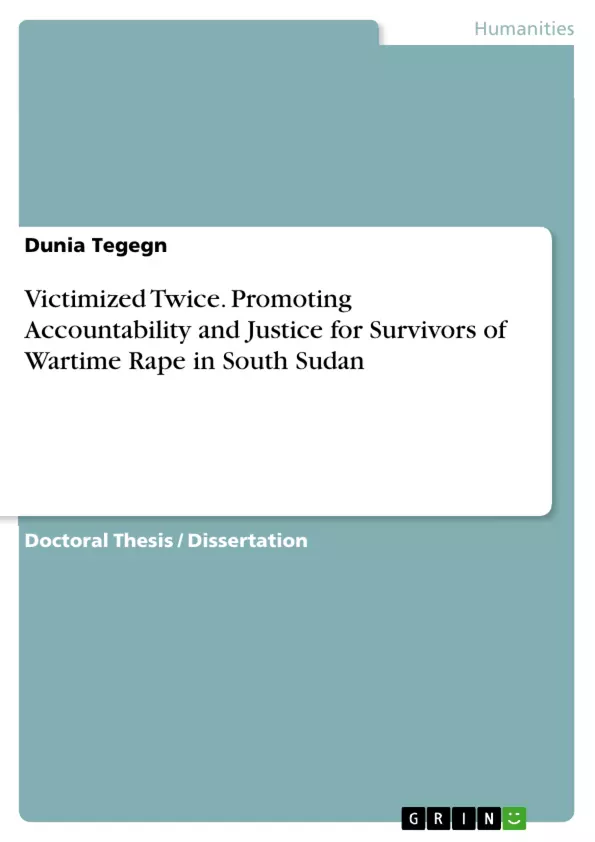In December 2013, South Sudan plunged into a massive scale of violence because of the outbreak of conflict between the Sudan Liberation Army and the Sudan People Liberation Movement. The fight took an ethnic turn as soldiers from the country's largest groups, the Dinka, and Nuer, divided their loyalties to either President Kiir or Mr. Machar respectively. While some civilians were caught in the crossfire, others were deliberately targeted along ethnic lines. Women are the immediate victims of this conflict because of rampant sexual abuse perpetrated against them.
The gender discrimination South Sudanese women were subjected to in their society before the conflict contributed to their victimization during the conflict. Women suffered in the areas of educational access, domestic violence, non-recognition of marital rape, and forced marriage. Even though South Sudan’s constitution, particularly under Article 16, provides full and equal dignity with men, women survivors of rape are still victims of gender-based discrimination due to the prevailing weak justice framework, and thus, victimized twice.
Wartime sexual violence including rape, gang rape, and sexual slavery remains a shocking reality in South Sudan today. Women who survive rape face threats and experience trauma including a desire to kill themselves and Post Trauma Stress Disorder (PTSD). They also experience stigma. As a result, many women are very reluctant to report rape. Old women from the enemy’s ethnic group are raped in order to make it clear to the enemy that they are incapable of protecting their mothers. The goal is to make the enemy feel emasculated, but women suffer the direct consequence. Women who refuse to be raped are shot through their private parts, and even those who are pregnant are forced into sexual intercourse. Some women become pregnant by their rapist.
Frequently asked questions about the language preview
What is this language preview about?
This is a comprehensive language preview which includes the title, table of contents, objectives and key themes, chapter summaries, and key words, focusing primarily on the South Sudan civil war and the systematic use of rape as a tool of warfare. It discusses legal frameworks and the development of a Hybrid Court for South Sudan (HCSS).
What key themes are explored in the text?
Key themes include: causes and consequences of the South Sudan Civil War, rape as a weapon of war, international and national legal frameworks addressing wartime rape, accountability mechanisms, promoting institutional inclusiveness for survivors, and recommendations to promote accountability.
What does the "Contents" section detail?
The "Contents" section provides a structured overview, listing sections such as: INTRODUCTION, Overview of the South Sudan Civil War, International Legal Frameworks, Regional Legal Frameworks, South Sudan's Legal Frameworks, Promoting Accountability (HCSS), and Structural Recommendations.
What international legal frameworks are mentioned?
The Convention on the Elimination of Discrimination against Women (CEDAW), the Rome Statute of the International Criminal Court, and United Nations Security Council Resolution 1325 are discussed.
What regional and sub-regional legal frameworks are highlighted?
The African Charter on Human and People's Rights, the Optional Protocol to the African Charter on Human and People Rights on Women's Rights (Maputo Protocol), and the Inter-Governmental Authority on Development (IGAD) are mentioned.
What does the preview say about South Sudan's legal framework?
The preview touches on South Sudan's legislative frameworks and the substantive jurisdiction of its judiciary.
What is the Hybrid Court for South Sudan (HCSS) intended to address?
The HCSS aims to promote accountability for wartime rape and other gross human rights violations, integrating gender-responsive standards in investigations and prosecutions.
What structural recommendations are outlined in the preview?
Recommendations target actions by the Government of South Sudan, the African Union Commission, the United Nations, and the United States of America to enhance accountability.
What challenges related to the implementation of the Regional and Sub-Regional frameworks are talked about in the text?
Challenges pertaining to implementing the frameworks, along with those to the regional and sub-regional frameworks are talked about in the language preview.
What is the gender lens that is used in the investigation and prosecution of wartime rape?
A focus of gender dismantles the discrimination of South Sudan's women during the Civil War, helps ensure that women's interests are addressed and taken into consideration in terms of justice and accountability framework development.
- Quote paper
- Dunia Tegegn (Author), 2016, Victimized Twice. Promoting Accountability and Justice for Survivors of Wartime Rape in South Sudan, Munich, GRIN Verlag, https://www.hausarbeiten.de/document/337547


